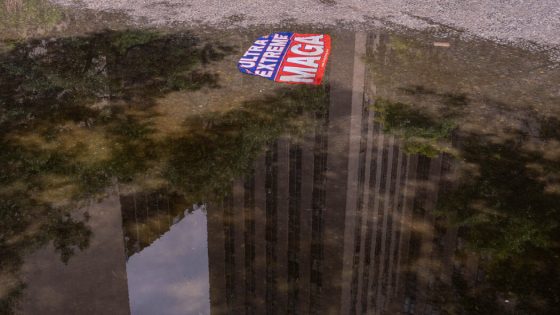Today, at 11:28 a.m., a jury of 12 New Yorkers began deliberating in the criminal trial against former President Donald Trump.
It’s worth lingering on that point. The first former president ever to be tried for a crime — a man who would like to be, and possibly will be, president again — is stuck in a courthouse in Manhattan, waiting for a jury to announce his legal fate.
It’s a sharp contrast from the norm in a presidential campaign where so much has seemed baked in, starting with two candidates. Trump and President Biden emerged from primary elections that generated nothing in the way of suspense to face each other in a matchup Americans have already seen.
This, instead, is a moment of genuine uncertainty.
We have no idea what the jurors will decide. We have no idea how it will shape the campaign in the months to come or whether, whichever way it goes, voters will care.
We just know that none of this, rife as it is with tension and absurdity, has happened before.
For Trump, who is not allowed to leave the courthouse while deliberations unfold, it’s a rare situation in which he has no control, as my colleague Maggie Haberman pointed out today. He can’t change the rules at court or dispatch his allies to appeal to the jurors. He just has to wait, uncertain as everybody else.
On Wednesday, however, he sought to puncture the aura of uncertainty. He marched to the ever-present cameras in the courthouse hallway and denounced the judge in the case, Juan M. Merchan, as “corrupt” and “conflicted.”
“Mother Teresa could not beat the charges,” he declared.
It was a move straight out of Trump’s playbook, finely honed over two presidential campaigns, one successful and one not: Say the game is stacked against you, whether or not you’re going to win.
Outside the courthouse on Tuesday, the actor Robert De Niro, a surrogate for the Biden campaign, veered off script to present a little certainty of his own, suggesting at once that Trump was guilty and that he might get off.
“The fact is whether he’s acquitted, whether it’s hung jury, whatever it is, he is guilty, and we all know it,” De Niro said, as hecklers tried to drown him out. “I’ve never seen a guy get out of so many things, and we all know this.”
It was an uncanny scene — the actor known for playing gangsters seemingly accusing Trump of being one.
But neither man is right. Only 12 New Yorkers know what will happen to Trump — and they may not yet be sure themselves, having deliberated for only about four and a half hours before heading home for the day on Wednesday.
That is a strong signal that the system is working. No one knows what will happen because now, after a two-month trial, it’s simply up to 12 Americans to agree on something.
INTO THE REPLIES
Your questions about the trial, answered
A while back, I asked you to send me your questions about Trump’s hush-money trial in New York. Many of your questions centered on what’s happening now: the deliberations, the potential verdict and the sentence Trump might face. Today, I’m diving into the big knowns and unknowns, inspired by what you all wanted to know.
How long will it take the jury to reach a verdict?
We truly, absolutely, completely, 100 percent do not know. It’s up to them.
Does the encounter alleged between Trump and Stormy Daniels have to be proved for Trump to be found guilty?
No. Trump has denied having a sexual encounter with Stormy Daniels. And while prosecutors did call Daniels to the stand, where she told her story of the episode in explicit detail, they needed to prove only that Trump falsified business records as part of a scheme to stop her going public with her allegations.
This is a case where the purported crime is in the cover-up.
Has Trump been charged with interfering with an election?
No. Trump is charged with falsifying business records, which is a misdemeanor unless it is done to cover up a second crime. In this case, prosecutors say that Trump falsified business records to hide a conspiracy to promote his election in 2016 “by unlawful means.” So the idea of election interference is woven into the charges against Trump — but it’s not the crime of which he is actually accused.
Is a unanimous decision from the jury required for conviction? Could Trump be found guilty of some charges but not all of them?
Yes and yes. To convict Trump on any of the 34 counts he faces, the jury must unanimously find that there is proof of guilt beyond a reasonable doubt. The jury would also need unanimous agreement to acquit Trump on any of the 34 counts. That means the jury has to make 34 separate decisions — which means Trump could be found guilty of some but not all of the counts.
It’s important to note, though, that while the jury needs to be unanimous to secure a conviction of the crime of falsifying business records, it does not need to take a unanimous view of the “unlawful means” Trump is accused of having used in the election conspiracy that prosecutors say took place.
If a unanimous verdict can’t be reached, the judge could declare a mistrial, and prosecutors would have to decide whether or not to bring the case again.
If Trump is found guilty of at least one felony charge, will that disqualify him from running for president?
No. The Constitution lays out only a few requirements to be president, and a clean criminal record is not one of them. Presidents simply have to be natural-born citizens, and they must be at least 35 years old. And they need to have lived in the United States for at least 14 years.
If Trump is convicted, will he lose the right to vote?
He probably would, but it depends on sentencing. Trump is registered to vote in Florida, where people who are convicted of a felony lose the right to vote while they are completing their sentence — including prison time, probation time and paying off any financial obligations related to their conviction.
If Trump is unable to complete his sentence before Election Day, he could apply for clemency to have his voting rights restored — a process that would require the approval of officials including Gov. Ron DeSantis, his former primary rival. He could also switch his voter registration back to New York, where convicted felons are allowed to vote while on parole or probation.
If Trump is convicted, will he go to prison? And where would he go?
For this question, I consulted my colleague William K. Rashbaum, who’s written extensively about New York law enforcement and Trump’s cases there. Here’s what he said:
If convicted, Mr. Trump faces a sentence that could range from a period of probation to four years in prison — what is known as a custodial sentence. If he were sentenced to up to a year, he would most likely serve that time in a city jail. A longer sentence would probably mean state prison. Some legal analysts with experience in this area see what’s known as a split sentence as the most likely outcome if he is convicted; that means six months in jail and six months of probation.
Would Trump get Secret Service protection in custody?
Yes, according to William, who said any jail or prison sentence would not be served in a standard jail or prison environment. Experts say he would most likely be incarcerated in an empty or closed facility or wing, with Secret Service agents by his side around the clock.
Can Trump be president from prison?
No one really knows, as my colleague Maggie Astor has reported. Nothing in the Constitution bars an imprisoned person from serving as president. Maggie has written that he could sue to be released, arguing that being imprisoned prevents him from fulfilling his duties as president.
“We’re so far removed from anything that’s ever happened,” said Erwin Chemerinsky, a constitutional law expert and the dean of the law school at the University of California, Berkeley, told Maggie. “It’s just guessing.”
If Trump is found guilty, what are his options for an appeal?
If he’s convicted, Trump is expected to mount an appeal that could take months or even years to resolve, and that would most likely delay his serving any prison sentence. I asked my colleague Alan Feuer, who is covering Trump’s legal travails, to tell us a little bit more about what we could expect.
There will be many possible legal issues Trump’s lawyers could exploit on appeal — everything from the decision to let the jury hear about catch-and-kill operations before the Stormy Daniels hush-money deal to how the jury instructions were designed. But it’s not really possible to say at this moment which ones they will focus on.
What is the status of his other cases? Will he face any more trials before Election Day?
With each passing day, it looks more unlikely that Trump will face another pre-election trial, as each of the three remaining cases is bogged down with its own form of delay, Alan said.
Here’s how he broke down the status of each of the three cases:
-
A Supreme Court ruling on presidential immunity will help decide if the Jan. 6 case goes to trial sooner rather than later.
-
The judge in the classified documents case is poised to make decisions that will determine if that proceeding goes in front of a jury any time soon.
-
And the election interference case in Georgia is awaiting an appellate ruling on whether the district attorney who brought the charges should be disqualified before any solid trial schedule can be set.
Source Agencies



